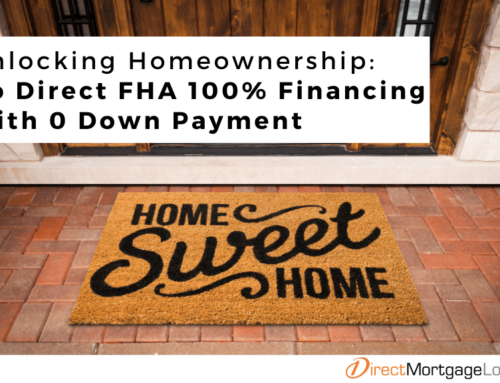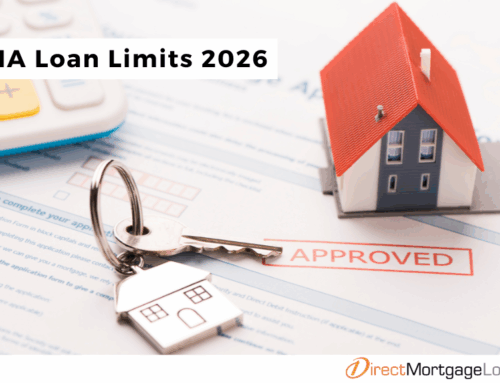Are you considering a home purchase that exceeds traditional loan limits? A jumbo loan could be the right financing option for you. In this article, we’ll discuss what a jumbo loan is, explore interest rates*, and highlight key requirements to help you decide if a jumbo loan is best fit for your needs.
Subscribe to our blog to receive notifications of posts that interest you!
What is a jumbo loan?
A jumbo loan is a mortgage designed for borrowers purchasing a home that exceeds the conforming loan limit set annually by the Federal Housing Finance Agency (FHFA). These loans, also known as non-conforming loans, do not adhere to the lending guidelines established by Fannie Mae and Freddie Mac.
How do jumbo loans work?
Jumbo loans are simply larger mortgages which could be used to purchase homes priced above the conforming loan limit. These types of mortgages are commonly used for primary residences, vacation homes, second homes, and investment properties and are available in both fixed-rate and adjustable-rate mortgages (ARM). 
Benefits of Jumbo Loans
- Financing higher loan amounts: Jumbo loans are designed to finance homes exceeding conforming loan limits, allowing you to borrow more than $766,550, depending on your area. This is ideal for purchasing higher-priced homes or investment properties.
- Flexibility in property types: Jumbo loans could finance various property types, including single-family homes, luxury residences, vacation homes, and investment properties, giving you more options in real estate.
- Customized loan terms: These loans offer flexible terms, allowing you to choose between fixed or adjustable rates, and customize repayment schedules to match your financial goals.
- Expanded home buying opportunities: With access to larger loan amounts, you could explore homes in high-cost markets or desirable neighborhoods where prices exceed conforming loan limits.
Jumbo Loan Requirements
While specific requirements may vary depending on the lender and your individual circumstances, here are some general criteria to consider when applying for a jumbo loan:
Jumbo Loan Down Payment
Jumbo loans typically require a down payment of 20% of the home’s purchase price. This larger down payment is due to the higher risk for lenders when financing these large loans.
Credit Score
Most lenders require a minimum credit score of 660, but some jumbo loan programs may have different requirements depending on your financial profile.
Debt To Income Ratio
Your debt-to-income (DTI) ratio, which measures your monthly debt payments compared to your monthly income, is another important factor. Lenders typically prefer a DTI ratio of up to 45% for jumbo loans, although some may have stricter requirements.
Property Type
Jumbo loans could be used to finance various property types, such as luxury homes, vacation properties, and investment properties that exceed conforming loan limits. However, certain types of properties, like manufactured homes or unique, hard-to-value properties, may not be eligible under some jumbo loan programs.
Jumbo Loan Limit
The jumbo loan limit in 2024 is any loan amount that is $1 over the conforming loan limit, which is $766,550 in most areas and $1,149,825 in many higher-cost areas. Any mortgage that exceeds these conforming loan limits is classified as a jumbo loan. At Direct Mortgage Loans, we offer jumbo loan amounts up to $3,500,000.
Jumbo Interest Rates
Jumbo loans typically have higher interest rates than traditional or government-backed mortgages. However, this isn’t a hard rule, as each loan is assessed individually. At Direct Mortgage Loans, we work with multiple jumbo loan investors who offer competitive pricing in specific situations. If you have a high credit score, a solid debt-to-income ratio, and a substantial down payment, you might qualify for a lower rate* than you would with traditional loans.
How Jumbo Loans Differ from Conforming Loans
Any mortgage that exceeds the conforming loan limit is considered a jumbo loan. Unlike conforming loans, which are backed by government-sponsored enterprises (GSEs), jumbo loans lack this backing. This increased risk for lenders often leads to stricter financial requirements. These requirements might include a higher credit score, a larger down payment, and a lower debt-to-income ratio.
Jumbo Loans VS Other Mortgage Loan Types
The main difference between jumbo loans and other mortgage types is that jumbo loans offer financing above the conforming loan limit. Since jumbo loans allow for larger loan amounts, these loans carry more risk for lenders than traditional loans, often resulting in stricter eligibility requirements and higher interest rates.
How To Apply For A Jumbo Loan
To apply for a jumbo loan, you’ll generally follow the steps outlined below. However, these steps may vary depending on your lender and individual financial situation.
- Speak With a Loan Officer: Start by speaking with a Loan Officer who offers jumbo loans. They will assess your financial situation and determine if a jumbo loan is the right choice for you.
- Gather Financial Documents: To secure mortgage pre-approval, compile essential financial documents, including details about your income, debts, and assets. This information will allow your lender to evaluate how much you qualify to borrow.
- Complete Mortgage Application: Once you have gathered your documents, submit them to your lender along with your mortgage application.
- Find a Home & Submit an Offer: After your application is underway, you could work with a trusted Realtor to find the right property. Once you find a home that fits your needs, submit an offer to the seller.
- Underwriting & Appraisal: When your offer is accepted, your Loan Officer will initiate the underwriting process. During this stage, the lender reviews your financials thoroughly to ensure you can manage the loan repayment. They’ll also arrange for an appraisal of the property to verify the home’s value aligns with the loan amount. If your loan amount is particularly large, your lender may require two separate appraisals to confirm the home’s worth and mitigate risk.
- Close On Your Jumbo Loan: The final step is the closing process. Your Loan Officer will inform you once everything is in order and you’re cleared to close. At this point, you’ll sign the final loan documents, complete any remaining paperwork, and officially close on your new property.
How can I find jumbo mortgage lenders near me?
If you’re searching for jumbo mortgage lenders in your area, Direct Mortgage Loans could help you determine your eligibility. Begin by contacting one of our expert Loan Officers to discuss your financial goals and specific circumstances.
Jumbo Loan Limits, Rates And Requirements FAQ’s
Will the jumbo mortgage limit increase?
The Federal Housing Finance Agency (FHFA) adjusts conforming loan limits annually, which could impact jumbo loan limits. When conforming loan limits rise, the gap between conforming loans and jumbo loan limits may increase, potentially raising jumbo loan limits. However, other factors, such as market conditions and lender policies, could also influence jumbo loan limits.
What is the minimum down payment for a jumbo loan?
The minimum down payment for a jumbo loan is 20%, but this can vary depending on factors such as your credit score, income, and the specific lender’s requirements.
How do jumbo loan interest rates compare to conventional loans?
Typically, jumbo loan rates are higher than conventional loan rates. Since jumbo loans carry higher loan amounts and pose higher risks to lenders, they often come with higher interest rates. Additionally, jumbo loans may require larger down payments and stricter qualification criteria compared to conventional loans. It’s important to consult with your loan officer for a clear understanding of the specific terms and conditions for jumbo loans in your area.
Do jumbo loans have fixed or adjustable rates?
Yes, jumbo loans can be either fixed-rate or adjustable-rate. A fixed-rate jumbo loan offers stable monthly payments throughout the loan term, making it a good choice for those who prefer consistency.
On the other hand, a adjustable-rate jumbo loan might suit you if you’re comfortable with some risk and expect interest rates to drop in the future, potentially lowering your costs over time.
What are the main alternatives to jumbo loans?
A popular alternative is a piggyback mortgage. This involves taking out a second mortgage alongside the primary loan, allowing you to finance above the conforming loan limit without paying for private mortgage insurance (PMI).
Can you get a jumbo loan refinance?
Yes, you could get a jumbo loan refinance, although it could be more difficult than refinancing a traditional mortgage.
*Rates are subject to change. Eligibility and approval is subject to completion of an application and verification of home ownership, occupancy, title, income, employment, credit, home value, collateral and underwriting requirements. Direct Mortgage Loans, LLC NMLS ID# is 832799 (www.nmlsconsumeraccess.com). Direct Mortgage Loans, LLC office is located at 11011 McCormick Rd Ste 400, Hunt Valley, MD 21031.







Leave A Comment
You must be logged in to post a comment.